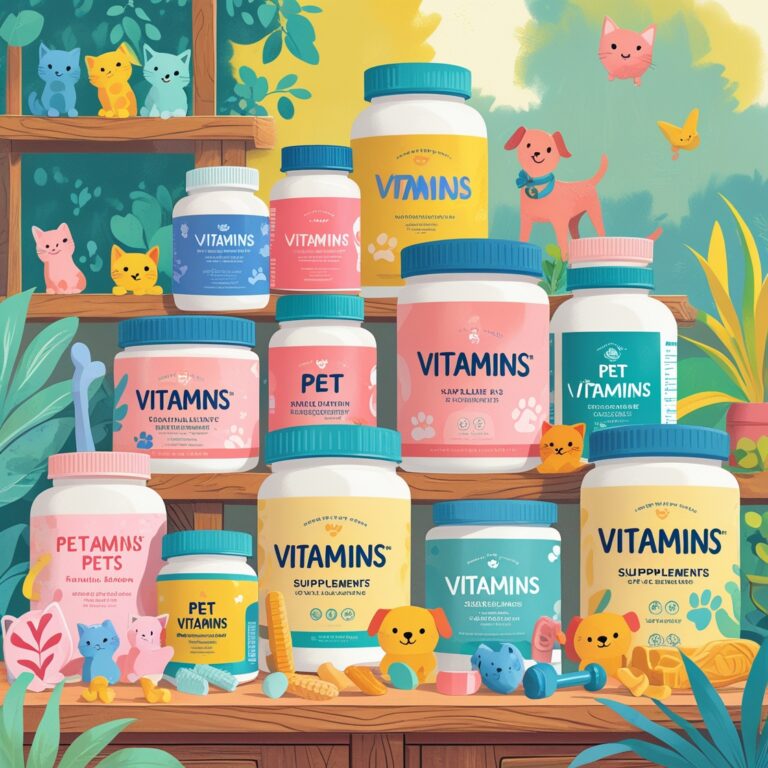When it comes to keeping your pet healthy, vitamins can play a key role — especially if your furry friend has dietary gaps, health conditions, or special needs. But if you’ve ever shopped for pet supplements, you’ve likely come across two main types: natural and synthetic vitamins.
So, what’s the difference? And which one is actually better for your pet?
Let’s break down the pros and cons of natural vs. synthetic pet vitamins so you can make the best choice for your four-legged friend.
What’s the Difference?
🟢 Natural Pet Vitamins
Natural vitamins are derived from whole food sources — like fish, liver, vegetables, and herbs. These vitamins are usually found in natural pet supplements or foods that are minimally processed.
Example: Vitamin C from acerola cherry or Vitamin E from sunflower oil.
⚪ Synthetic Pet Vitamins
Synthetic vitamins are man-made in a lab to mimic the chemical structure of natural vitamins. They’re often used in commercial pet foods and supplements because they’re more stable and cost-effective.
Example: Ascorbic acid (synthetic Vitamin C) or dl-alpha-tocopherol (synthetic Vitamin E).
Natural Pet Vitamins: The Pros and Cons
✅ Pros
- Better Absorption (Bioavailability): Vitamins from whole food sources may be easier for the body to recognize and use.
- Fewer Additives: Natural supplements often have fewer artificial fillers or preservatives.
- Holistic Nutrition: Natural vitamins come with beneficial co-factors (like enzymes and antioxidants) found in whole foods.
❌ Cons
- Higher Cost: Natural supplements are usually more expensive due to sourcing and manufacturing.
- Less Potent Per Dose: Natural vitamins may require higher dosages to reach therapeutic levels.
- Shorter Shelf Life: Whole-food-based supplements may spoil faster.
Synthetic Pet Vitamins: The Pros and Cons
✅ Pros
- More Affordable: Synthetic vitamins are cheaper to produce and purchase.
- Precisely Measured: They provide consistent dosages, ideal for addressing specific deficiencies.
- Longer Shelf Life: Synthetic products often last longer and are more stable.
❌ Cons
- May Be Harder to Absorb: Some synthetic forms are not as bioavailable, meaning your pet may not absorb them as effectively.
- May Contain Additives: Some synthetic supplements include artificial flavors, colors, or preservatives.
- Can Lack Supporting Nutrients: Unlike natural sources, synthetic vitamins may not include co-factors that help with absorption.
Which One Is Better?
The answer depends on your pet’s health needs, your budget, and your approach to pet care. Here’s how to decide:
| Situation | Better Choice |
|---|---|
| Your pet eats a raw or homemade diet | Natural vitamins can help round out nutrition with food-based sources. |
| You’re treating a specific deficiency (like low Vitamin D) | Synthetic vitamins offer precise, measurable dosing. |
| You prefer holistic or organic pet care | Natural supplements align with this lifestyle. |
| You’re on a tight budget or need a long shelf life | Synthetic supplements may be more practical. |
What Veterinarians Say
Most veterinarians agree that both types can be effective when used correctly. What matters most is:
- The quality of the product
- Proper dosage and safety
- Matching the supplement to your pet’s specific health needs
If you’re unsure, ask your vet for guidance — especially before starting a new supplement regimen.
Final Thoughts
Choosing between natural and synthetic pet vitamins ultimately comes down to what works best for your furry friend. Natural vitamins may provide a more holistic, whole-food-based approach, potentially offering additional nutrients and benefits from their organic sources. On the other hand, synthetic vitamins are formulated for precision, consistency, and affordability, ensuring pets receive the exact nutrients they need.
The best decision is the one that supports your pet’s health, aligns with your lifestyle, and matches your values. But above all, quality is key—prioritize vet-approved, reputable brands with transparent ingredient lists to ensure safety and effectiveness.
Providing your pet with the right nutrients is an act of care that reflects your commitment to their well-being. By making informed choices, you’re setting them up for a vibrant, happy life. Keep researching, stay curious, and trust yourself—you’re already taking the right steps toward your pet’s optimal health!


